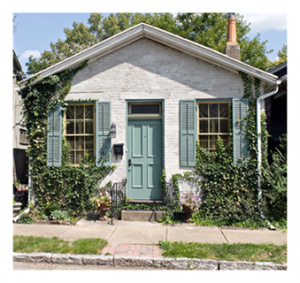The narrow street is barely recognizable except for two low-rise apartment buildings and a clapboard cottage. Maybe two.
 The sprawling campus of brick has transformed the landscape, but this is only a single example of the gentrification that continues in my neighborhood.
The sprawling campus of brick has transformed the landscape, but this is only a single example of the gentrification that continues in my neighborhood.
These particular structures, quite pretty in fact, are part of an expanded private school that sits adjacent to the public school my sons attended. I nonetheless prefer that public school, a 1930s facility with its 10-year-old renovations. It is a place where my little ones learned, played, and made friends – friends from all over the world and from every economic stratum.
The street is minus a few eyesores, it’s true, and likewise, low income housing that enabled immigrant families to give their children a solid educational start.
“Progress,” I mutter, hearing my own contempt.
Resistant to Change… or Cynical
A few days ago, I was forced to take a more circuitous route than usual to make a meeting. This was after sitting in a traffic jam only a mile away – reminding myself to breathe in order to combat my growing anxiety – able to see my destination although it was impossible to reach.
The reason for the jam? I have no idea, though part of the stretch of road is under construction. It is yet another widening of lanes or allowance of an overpass to encourage more traffic, more traffic, always more traffic.
I’m angry, and I find myself yelling at the steering wheel: “Why can’t we have public transportation that reduces the need for more cars, more pollution, more highway?”
I’m frustrated, I’m stuck, I’m inching along, and eventually I arrive – late. On the return, two new houses under construction catch my eye, dwarfing the homes on either side. I feel dismay, disgust, and a hint of hopelessness. Does a family of three or four really need a six-bedroom six-bath?
Is Cynicism Unavoidable?
There are days I imagine myself to be moderately optimistic – about people, about the future, about the world that my children will inherit and improve upon. There are moments, too numerous, in which I’m thoroughly disheartened.
Although I remind myself that cynicism is not pessimism, it certainly qualifies as a close cousin. Then I wonder if cynicism is unavoidable as we grow older – if it is the natural, albeit self-protective response in the face of unwanted change, or futility when we feel we’re too small to keep up the good fight.
Is cynicism actually a nuanced understanding of the world? One that replaces our youthful ideals?
If cynicism is weary acceptance of what we perceive as events beyond our control, where does that leave our willingness to persist in what we believe? At the very least, will we have the strength, the stamina, the courage, and the means to pick our battles from time to time?
Tilting at Windmills, Pragmatism, Defeatism
Tilting at windmills can be energizing when we’re young, though years of fighting the good fight (and failing) will dissipate our energies. But maybe that’s my cynicism talking – cynicism with its beleaguered quality, its sense of looming defeat, its residue of been there, done that, and lost the battle.
Yet how do we explain those who keep going, keep standing up, don’t give in to futility and fatigue, convinced that the little guy can take on Goliath and win, or that most of us will choose our better angels?
 Is there a psychological predisposition to cynicism?
Is there a psychological predisposition to cynicism?
What Makes People Cynical?
In searching for a psychological profile typical of the cynic, I didn’t get very far. However, this article at Psychology Today asks if cynicism is ruining our lives.
Psychologist Lisa Firestone describes cynicism as masking underlying negative emotions, and she explains:
… Cynicism is part of a defensive posture we take to protect ourselves. It’s typically triggered when we feel hurt by or angry at something, and instead of dealing with those emotions directly, we allow them to fester and skew our outlook. When we grow cynical toward one thing in our lives, we may slowly start to turn on everything.
That’s all well and good, but if cynicism is a defense mechanism to cover anger (for example), what about those of us who are “selectively” cynical as a means to cope?
Cynicism vs Skepticism
Personally, I prefer Psych Central’s take on cynicism, specifically the article by science writer and researcher Jamie Hale that distinguishes cynicism from skepticism.
… Often people confuse “skeptic” with “cynic.” Skeptic is derived from the Greek skeptikos, which means, “inquiring” or “to look around.” The skeptic requires evidence before claims are accepted as fact…
And the cynic? Try this on for size:
… Cynics are distrustful of any advice or information that they do not agree with themselves. Cynics do not accept any claim that challenges their belief system… [It] means taking a negative view and not willing to accept evidence for the claim…
Beaten Down, But… Not Cynical After All?
As I consider whether or not I’m cynical, thinking that perhaps I am, perhaps I’m off-base.
 Yes, I’m deflecting the full force of my anger as I watch charming neighborhoods, including my own, devolve into cookie cutter communities for the rich. Yes, I’m furious that the very socioeconomic mix that drew me to where I live and enriched so many children’s lives is slowly being eliminated. Yes, I am skeptical when someone expresses the positive aspects in this evolution – property values rising, a safer neighborhood, etc.
Yes, I’m deflecting the full force of my anger as I watch charming neighborhoods, including my own, devolve into cookie cutter communities for the rich. Yes, I’m furious that the very socioeconomic mix that drew me to where I live and enriched so many children’s lives is slowly being eliminated. Yes, I am skeptical when someone expresses the positive aspects in this evolution – property values rising, a safer neighborhood, etc.
I’d like evidence please, followed by a process of balancing those claims with the far-reaching advantages to the next generation. Wouldn’t those children benefit from what my sons experienced – a diverse, quality public school education?
As I contemplate the ways in which I may be viewed as cynical, I’m aware that there is a core aspect in my attitude that is counterintuitive. Perhaps the cynic appears indifferent or shut down, as though he or she no longer cares. I believe the opposite is true; the cynic, quite possibly, cares too much.
You May Also Enjoy
I’m realistically cynical, but still hopeful.
I am a cynic, I am French!!!!!